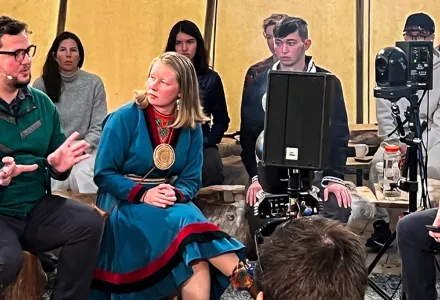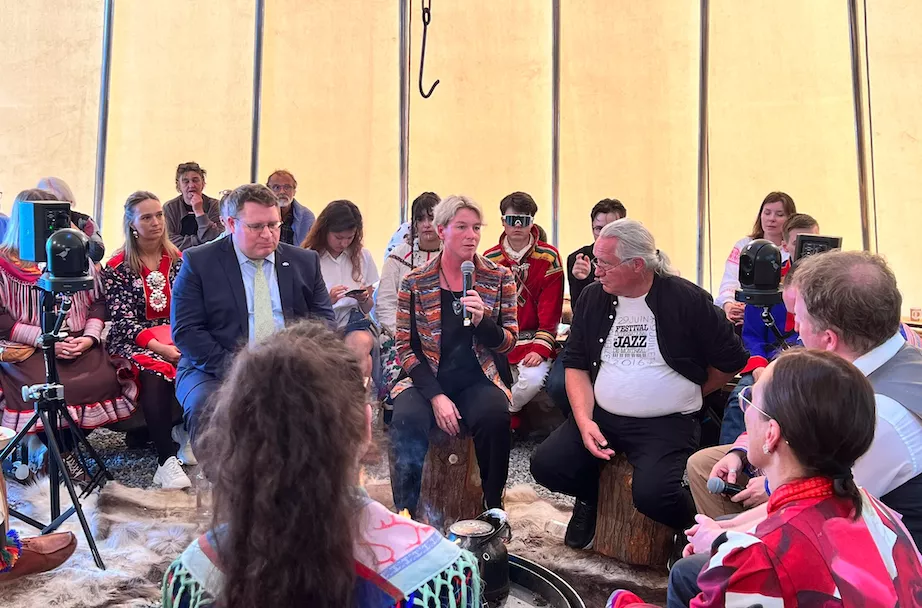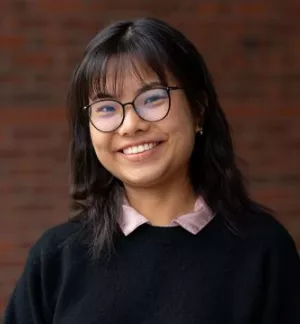
Many Arctic Indigenous Peoples are deeply connected to their environments and hold unique and important knowledge of food systems, land, and water. These ties mean that Indigenous communities are often best-positioned to monitor and manage the environment around them. However, historically, Indigenous Peoples have been excluded from decision-making processes involving the land and resources on which they depend. In the face of drastic Arctic climate change, the empowerment of leaders within these communities is not only necessary but urgent.

In August, 20 Arctic Indigenous youth leaders gathered in Arendal, Norway, to attend the Advancing Resilience in Arctic Communities Workshop. The workshop was part of an ongoing collaboration between the Arctic Initiative, the International Centre for Reindeer Husbandry, the UArctic EALAT Institute, and World Reindeer Herders to empower local communities through capacity building, training, and knowledge sharing, while elevating youth voices and strengthening Arctic unity.
Over the course of the workshop, the participants deepened their knowledge of permafrost thaw, food systems, and wetlands. They also received training on communication, crisis management, and negotiation tactics—hands-on soft skills development crucial to preparing them to become leaders in their own communities.
Wilfried Kuugaraq Zibell, Arctic Initiative Summer Project Coordinator and a native of the Iñupiaq village of Noorvik, Alaska, emphasized that the only way to realize Arctic resilience in the changing environmental, social and political landscape is through prioritizing local decision-making. Zibell felt inspired by the solidarity among the Indigenous youth leaders from different countries that they observed at the workshop. “Seeing people who are young and invested in the future of their own people and recognizing we share a future together was incredible,” said Zibell.
Arctic Initiative Senior Fellow Jennifer Spence, the lead workshop organizer from Harvard Kennedy School, remarked on the “organic empowerment” of the youth leaders during the workshop that came from being surrounded by one’s peers: “One youth would step up and speak their mind, and that gave others the confidence to do so as well. We observed the strength they gave each other.” Holding the workshop in Arendal also gave the participants unique access to high-level politicians and officials attending Arendalsuka, Norway’s largest annual political gathering. Spence added, “The youth participants actively engaged with officials and experts on topics they cared about, which was also empowering.”
“Seeing people who are young and invested in the future of their own people and recognizing we share a future together was incredible.” – Wilfried Kuugaraq Zibell
This workshop also provided a rare platform for youth leaders from different Indigenous communities to network and bond with peers, building cross-border trust and opening new channels for future collaboration in the region. Equipped with the knowledge and experience passed on through training sessions hosted by area experts, the participants are better prepared to become the next generation of interdisciplinary and solution-oriented Arctic leaders.
This group of youth leaders will meet again at Harvard Kennedy School in January 2023 to further develop their knowledge and skills.
Xiao, Yifei. “Advancing Resilience in Arctic Communities: International Workshop on Indigenous Youth Leadership.” Belfer Center Newsletter, Belfer Center for Science and International Affairs, Harvard Kennedy School. (Fall 2022)


